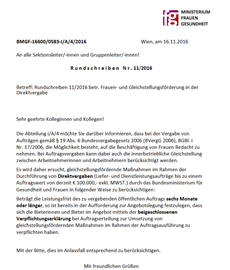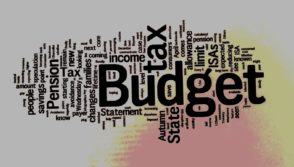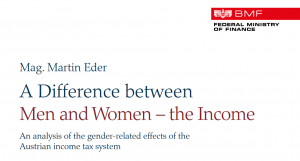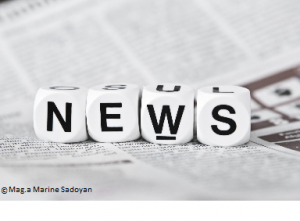 Public procurement law is an instrument to guarantee effective and transparent competition in public procurement and, as such, it is part of Gender Budgeting. As public procurement has a high significance in terms of GDP (nearly 20% of Austrian and European GDP), a state’s decisions on how to procure have a lasting effect on the economy and on society at large.
Public procurement law is an instrument to guarantee effective and transparent competition in public procurement and, as such, it is part of Gender Budgeting. As public procurement has a high significance in terms of GDP (nearly 20% of Austrian and European GDP), a state’s decisions on how to procure have a lasting effect on the economy and on society at large.
The aim of promoting women and gender equality is in line with competition law and art 19 para 6 of the Austrian Public Procurement Law (Bundesvergabgesetz). Following other ministries‘ commitment in this regard, the Ministry of Health and Women’s Affairs has published a circular on integrating measures to promote women and gender equality in public procurement below EUR 100,000 in December 2016. In accordance with this circular, companies are obliged to present or implement measures to promote women and gender equality if they are awarded a contract below EUR 100,000 whose term exceeds or is equal to 6 months. They can choose from a catalogue of four categories (“employment and career advancement”, “qualification”, “reconciliation of work and family life” and “structural measures”), which is an integral part of the circular. The number of measures to be chosen differs according to company size and there are exemptions for very small ones. Also, prove must be given halfway through the term. Click here to access an unofficial English translation of the Declaration of Commitment, inclusive of the Catalogue of Measures that goes with it.
Leave a reply by using the form below. If you cannot access the comment section, please send us your statement by mail to: imag-gmb@bka.gv.at!

 31/05/2017: This day marked the date when the fourth report on the impact-oriented impact assessment (WFA Bericht) was submitted to the National Council . The report is a summary of the results of the internal evaluations carried out by the ministries and other supreme organs. It is compiled by the Federal Performance Management Office, which is part of the Federal Chancellery. The
31/05/2017: This day marked the date when the fourth report on the impact-oriented impact assessment (WFA Bericht) was submitted to the National Council . The report is a summary of the results of the internal evaluations carried out by the ministries and other supreme organs. It is compiled by the Federal Performance Management Office, which is part of the Federal Chancellery. The 
 Public procurement accounts for approximately one fifth of our GDP. By procuring works, goods or services, the state acts as a role model and shapes society and the economy. As it enters into public agreements, the state makes use of public budgets. Therefore, the constitutional duty of gender budgeting applies.
Public procurement accounts for approximately one fifth of our GDP. By procuring works, goods or services, the state acts as a role model and shapes society and the economy. As it enters into public agreements, the state makes use of public budgets. Therefore, the constitutional duty of gender budgeting applies. Public procurement law is an instrument to guarantee effective and transparent competition in public procurement and, as such, it is part of Gender Budgeting. As public procurement has a high significance in terms of GDP (nearly 20% of Austrian and European GDP), a state’s decisions on how to procure have a lasting effect on the economy and on society at large.
Public procurement law is an instrument to guarantee effective and transparent competition in public procurement and, as such, it is part of Gender Budgeting. As public procurement has a high significance in terms of GDP (nearly 20% of Austrian and European GDP), a state’s decisions on how to procure have a lasting effect on the economy and on society at large. At least since 2014, it has been clear to us that the Austrian Gender Budgeting model has become an international example of best practice. Back then, a
At least since 2014, it has been clear to us that the Austrian Gender Budgeting model has become an international example of best practice. Back then, a 